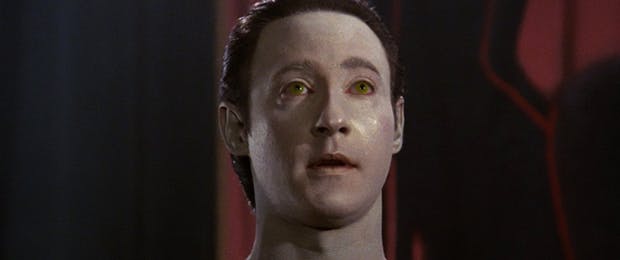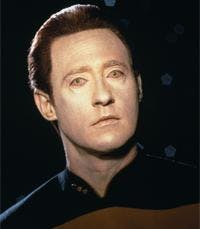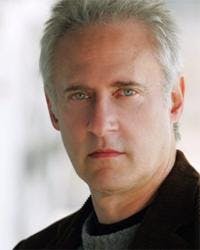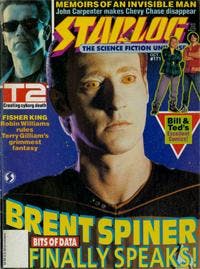Published Jan 6, 2014
STARLOGGING WITH DAVID McDONNELL: A (Secret) Good Deed For Data
STARLOGGING WITH DAVID McDONNELL: A (Secret) Good Deed For Data


Back then, there was only one problem: Spiner didn’t do interviews. And I had two magazines to fill with all things Trek—the monthly Starlog and a four-times-a-season Official Next Generation magazine (licensed from Paramount Pictures Television and totally devoted to that TV series to the exclusion of all else). We interviewed all the regular cast (including, briefly, Spiner) for Next Generation issue #1 and then everyone but Spiner again for various other editions (alternating appearances in both magazines) and then everybody, save him, yet again. There was even one week early on, I had two writers talk to Marina Sirtis (one on Thursday, the other, Saturday) about different things and published the resulting pieces a few months apart, one in Starlog, the other in Next Generation.

However, I was offered the opportunity to have a Starlog writer chat with Data—in other words, with Spiner who would be improvising answers as if he really was the android, not replying as himself. Well, I had been offered the chance to talk to alien sitcom star ALF, Short Circuit robot Johnny Five, etc., and, with delusions of journalism then dancing in my head, I turned them all down. Nowadays, I’m (certainly) older, (perhaps) wiser and (undoubtedly) mellower, so I would probably say, "What the devil! Who could it hurt? Why not?"
By not talking, Spiner inadvertently became a more precious resource, a rare commodity, a better "get" (in entertainment journalism jargon). Scarcity sells! We really, really wanted an interview with him.

After that, the deluge. Spiner talked a lot. For whatever reason, Spiner started talking regularly, chatting with my writer Ian Spelling for every subsequent TV season and Trek film (and also his short-lived SF TV series Threshold). He turned out to be a really articulate guy, quite a good, thoughtful interviewee.
Eventually, I met Spiner and did him a small good turn. And, no, he doesn’t know that I did this, but I’ll reveal it here–my hitherto secret good deed for Data.
It was 1996 and Independence Day producer/co-writer Dean Devlin had persuaded Spiner to guest at Denver, Colorado’s StarCon in promotional support of that disaster film (bringing convention virgin Jeff Goldblum along for the ride). I encountered Spiner backstage before the Independence Day presentation and thanked him for talking to Starlog. We shook hands and chit-chatted briefly. Then, I moved three feet away to watch the final moments of the event just winding up: director Francis Ford Coppola on stage discoursing about Bram Stoker’s Dracula.
That’s when I was close enough to hear Spiner sigh out loud in distinct, fannish admiration to his colleague: "Francis Ford Coppola! Wow! I’d really like to meet him!"
I scurried away in the darkness and buttonholed my publicist pal Jeff Walker (who had arranged for Coppola’s appearance). "Jeff!" I hissed. (Goldblum, several paces away, looked at me and I belatedly realized both had the same first name. Cue chagrin!) "Brent wants to meet Francis!" I told Walker.
"Is that wise? Do you think Francis knows who Brent Spiner is?"
He had a point. Surely, Coppola had heard of Star Trek, William Shatner and Leonard Nimoy (and maybe Patrick Stewart), but any other Trek regulars in 1996? Not so sure. (Although there must be more, today I can only think offhand of three Trek guest stars who had also worked for Coppola: Dementia 13’s William Campbell, Dracula’s similarly named Billy Campbell and One from the Heart’s Teri Garr). It didn’t matter. "He’ll know Star Trek," I declared. "Tell Francis he’s from Star Trek."
And so when Coppola came off stage, Jeff made a special point of introducing him to an awed and attentive Spiner, and they talked. A wish granted! As Coppola disappeared for an autograph session and waiting airport limo, I overheard Brent Spiner tell his friend with utter sincerity, "Well, that made my week!"
________________
David McDonnell, "the maitre’d of the science fiction universe," has dished up coverage of pop culture for more than three decades. Beginning his professional career in 1975 with the weekly "Media Report" news column in The Comic Buyers’ Guide, he joined Jim Steranko’s Mediascene Prevue in 1980. After 31 months as Starlog’s Managing Editor (beginning in October 1982), he became that pioneering SF magazine’s longtime Editor (1985-2009). He also served as Editor of its sister publications Comics Scene, Fangoria andFantasy Worlds. At the same time, he edited numerous licensed movie one-shots (Star Trek and James Bond films, Aliens, Willow, etc.) and three ongoing official magazine series devoted to Trek TV sagas (The Next Generation, Deep Space Nine, Voyager). He apparently still holds this galaxy’s record for editing more magazine pieces about Star Trek in total than any other individual, human or alien.
